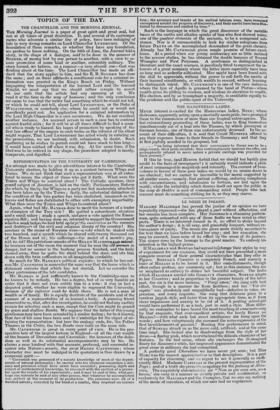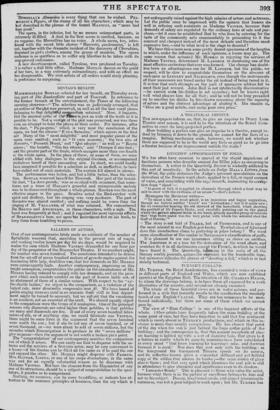LE NOZZI DI FIGARO.
MADAME MALIBR.AN has .proved :the justice of an opinion we have repeatedly expressed—she has played a part without affectation, and her success.hasbeen complete. Her Susannais a charming perform- ance, quite.untouched with any of .those faults 'We have notedin other 'parts. There is no laboured- conceit in it, no effort to strike beyond the author's design ; it is 'all easy, and gracefully buoyant, without ex- travagance of gaiety. The music she gives more strictly accordant to the text than we have before heard her sing ; 'and her execution, she may be assured, loses none of its effect by the sense of its justness. The singer rises by the homage to the great master. To embody his intention is the highest praise. If MALIBRAN and SONTAG had agreed tolchange their styles by way of experiment for one occasion, they could not have presented a more complete reversal of their general characteristics than they offer in Figaro. SONTAG'S Countess is completely French, and scarcely a trace of MOZART is to be found in it. Her embellishments, though often rather profuse, are commonly apt ; but in this instance they are so misplaced as entirely to deface her beautiful subject. The faults which MALIBRAN carried into ROSSINI'S characters, SONTAG adopts in her Countess; and in proportion to the greater beauty of the latter part, the sin is the more heinous. " Porsa amor," she sung with best effect, though in a manner far from faultless; and her "Voi che sapete" was absolutely and unqualifiedly bad—defective in voice, ex- pression, and every requisite. She sung that delicious piece in a careless jiggish style, and faster than its appropriate time, as if from sheer impatience and anxiety to be rid of it. A pouting school-girl would have performed it, as a task, just in such a style. How differ- ently we remember to have heard the most touching of canzonets sung by that exquisite, that ever-excellent artiste, the lovely RONEI DE BEGNIS !—with what arch but sweet intelligence she hung upon the words ; and how voluptuously she caressed the notes expressive of the first bewilderments of passion ! Bearing this performance in mind, that of SONTAG struck us as the more cold, artificial, and at the same time inapt. She looked also to disadvantage from the style of her dress,—a flaring pink, which overwhelmed the delicate character of her features. In the last scene, where she exchanges the ill-imagined finery for Susanna's white, her improved appearance demonstrated the great error in millinery she had committed. A perfectly good Cherubino we have never yet seen ; but Miss Moat was the nearest approximation to that description. It is a part of capacity for charming, and we regret to see it generally so ineffi- ciently filled. Madame CASTE L LI is the present representative of the Page; and of a truth she presents no apology for the jealousy of Alma- viva. The exquisitely characteristic air "Non so piu cosa son, cosa faccio," she sung in a manner so strictly private and confidential, so exclusively for MALIBRAN and the Prompter, that we can say nothing of the mode of execution, of which our ears had no cognizance. 'DoNzEma's .illmaviva is every thing that can be wished. FEL- SEGRINI'S Figaro, of the stamp of all his characters ; which may be lest described in the phrase of the famed MAJOCCI, as "more bad ban good." The opera, in the inferior, but by no means unimportant parts, is txtremely ill-filled. A duet in the first scene is omitted, because, as ive suppose, the Marcellzna has no voice. A whole scene too, intro- duced with the sweet little chorus " Riceveto, pardroncina," is left out, together with the dramatic incident of the discovery of Cherubino, disguised in girl's clothes, among the "group of maidens. The opera tudience is so spiritless as to suffer any liberties to be taken with its tong-proved endurance. A new divertissement, called Tyrolese, was produced on Tuesday. :t is rather a dull little affair. Madame Mouern dances on the point of her toes, in a way extremely extraordinary, and with an effect no kss disagreeable. We wish artists of all orders would study pleasing, ii preference to surprising.



















 Previous page
Previous page